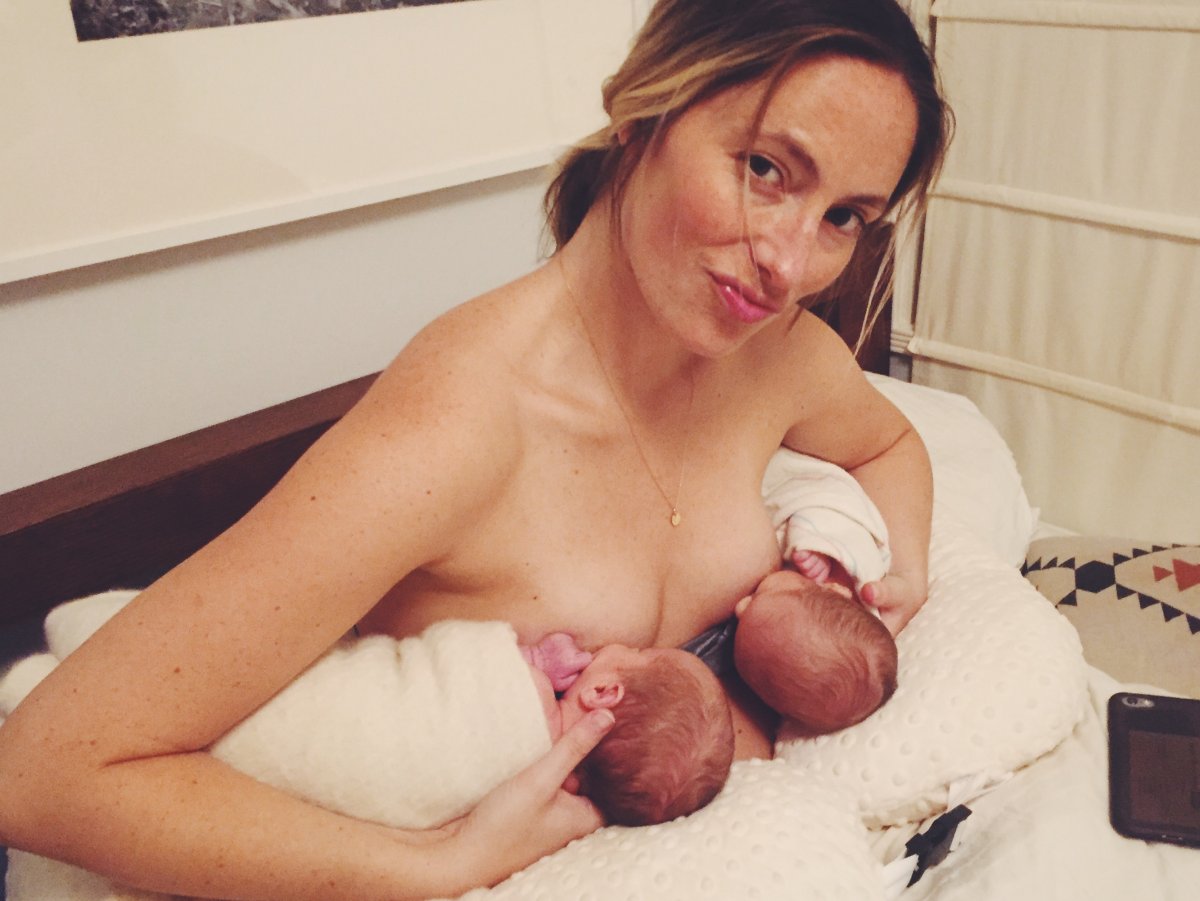Elaina Bellis hasn’t shied away from sharing the most personal and painful experiences of her life with strangers.

“Oftentimes on social media people portray rainbows and sunshine, and not always the truth of what’s really happening in their life,” the California mother said.
“Through my first pregnancy and now [my second], I’ve just realized how many things are closed behind doors.”
“And I don’t understand that… Why don’t people talk about everything more?”
To help break the stigma that can shroud certain family matters in silence, she first opened up about her son’s stillbirth in Dec. 2014. She’s since also spoken about her struggle to breastfeed her one-month-old twin girls.
“I pump all day to be able to provide my girls with one ounce of my milk,” Bellis wrote last week on the photo-sharing site.
She tried everything to increase her supply, passing her days drinking special tea and taking vitamins. Her nights were spent breastfeeding, pumping and making formula for the girls to make sure they were getting enough food.
She also fit in visits with lactation consultants in between caring from her newborns.
“After two weeks of doing that I was losing my mind.”
So she took to social media.
She explained to Global News that her traumatic “crash cesarean” was a big reason she’s had such a hard time nursing.
Doctors had to rush her into the operating room on March 12, when they realized the umbilical cord was cutting off the oxygen supply to one of the babies.
The identical girls, Quincy Kay and Rowe James, were delivered seven minutes later. They were five weeks early, but OK.
‘I was losing my mind’
Their mom, however, came close to losing her life.
“I lost three litres of blood and there’s only four in your body. I had to get two blood transfusions.”
READ MORE: American women twice as likely to die in childbirth than Canadian women: report
The blood Bellis received lacked hormones to facilitate breastmilk production.
A few of her friends gave her some of their breast milk. But Bellis admits the pressure she feels society puts on mothers to breastfeed their babies had gotten to her.
“You see all these Instagrams of women breastfeeding… and you want that,” Bellis said. “I don’t know anyone that doesn’t want it.”
“And when you can’t, it’s so crushing, I don’t know how else to describe it… There’s so much guilt that comes with it.”
‘There shouldn’t be this crazy pressure to nurse’
Her post clearly hit a nerve with those on the social platform. Comment after comment poured in from moms who echoed what a “nightmare” breastfeeding can be.
“I was the same way with my twins. I would pump for 50 minutes and maybe get an ounce. I tried so many things, different pumps, eating certain foods,” one woman wrote. “There shouldn’t be this crazy pressure to nurse, not everyone can.”
A mother-of-four called the breastfeeding difficulty she had with her three oldest children “heartbreaking.”
“With my third my milk never even came in… And to make matters worse, I am a dairy farmer. Our family business is making milk.”
Mary Kathryn wrote: “We hear so much about how amazing breastfeeding is (and it is) but not often enough that it’s not possible for everyone. I struggled for just under six months trying everything I could and it still wasn’t enough for my one baby.
“I felt like a failure for a long time but finally realized I had done everything in my power to provide for my little guy.”
READ MORE: ‘It felt like we were going rogue’: mom who let friend breastfeed her baby
“For so long I felt inadequate as a woman,” someone else said. “Thank you for bringing light to the subject.”
“It lets us know we aren’t alone on this journey,” another commenter added.
Experts have previously told Global News that sharing on social media can be a form of therapy and release.
“When we know we’re not alone in our experiences, that has been shown to increase acceptance and normalization of whatever you’re going through,” explained Toronto psychotherapist Natasha Sharma.
WATCH: A viral video last summer raised questions about how much sharing of personal information is too much
When Bellis shared the loss of her stillborn son Lincoln on Dec. 11, 2014, she received a similar flood of support from women around the world.
Laura Beck was one of them. “I am a bereaved momma too,” she wrote. “My son lived for four days and then passed. There is an entire community out here for you to support you if you need it.
“You are not alone.”
READ MORE: Stillbirth and infant loss: Your stories
Bellis said all the words of encouragement, along with meditation, helped her eventually come to peace with what had happened then.
This time around, hearing from all the countless women has helped her let go of the guilt she had for not being able to breastfeed.
“It’s really remarkable. It really feels like this sister-bond.”
She hopes that bond can continue to help other women feel less alone in their struggles.


Comments